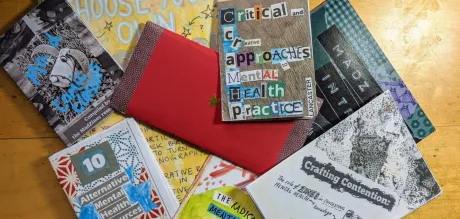A new article published in Social Work Education: The International Journal demonstrates how zines—self-published booklets often created by those with lived experience—an serve as a powerful medium for communicating alternative forms of Mad-centered knowledge across various learning contexts.
Researchers Jill Anderson and Hel Spandler from the University of Central Lancashire respond to the urgent need for alternative ways of understanding, practicing, and imagining mental healthcare through the Madzines Research Project.
They define Madzines as “not-for-profit, low-budget, self-published and/or low-circulation booklets, graphic memoirs, comics, or other visual narratives” that challenge dominant conceptualizations of mental health. These zines are created by individuals with lived experience of mental illness, psychosocial disability, or other psychiatrized mental experiences.
Drawing from their research, which they acquired, spent time with, created their own zines, and facilitated Madzine workshops, the authors argue for a Madzine pedagogy. This pedagogy would involve using zines as critical mental health teaching and learning resources in social work curricula, offering new ways of producing knowledge in the mental health field that challenge sanist and ableist educational practices.
They write:
In our project, we define madzines as zines that ‘craft contention’ about madness and distress, and how such experiences are lived with, understood, and responded to. Madzines are usually created and read by people with lived experience of mental ill-health, neurodiversity, psychosocial disability and/or other conditions that have been psychiatrized. They question accepted understandings of mental health and associated practices, policies and politics, and we use a Mad Studies lens to bring them into view.”
By incorporating zines into social work education, the researchers hope to foster a more critical and inclusive approach to mental health that reconnects the profession with its radical and activist roots.
“We think there is a strong case for introducing madzines as a form of critical pedagogy in social work education, as a means of supporting, valuing and integrating grassroots bottom-up experiential knowledge. This, in turn, might help re-connect with the profession’s more radical and critical potential.”
















That is really interesting- never heard of a zine.
Report comment
Artwork and writing one’s story – aside from love, heathy eating, and regular moderate exercise – are the best medicines. If that’s what Madzines are meant to incorporate into the “mental health” or “social worker” industries, I’m sure they’re a good idea.
Report comment